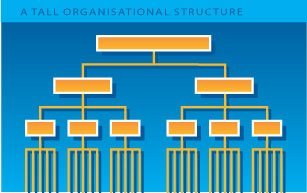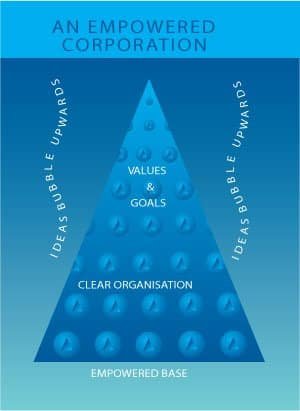This case study focuses on the way in which ICI, one of the UK’s best known companies, has maximised the potential of its people in recent times. ICI has established some clear guiding principles which provide an object lesson for any business which seeks to be effective in today’s competitive business climate.

Today, all this has changed and nowhere more so than at ICI’s operating units throughout the world. At ICI, the new philosophy is to move decision making increasingly away from the centre, to individual businesses and in individual businesses to individuals and teams.

Empowered employees will be best able to help the organisation to meet its objectives. Provided employees understand the objectives of an organisation and are encouraged to help the organisation to meet these objectives, then they will be able to help the organisation by introducing their ideas and solutions to problems.
In the next illustration you can see that empowered employees can start with all sorts of ideas which then bubble up within the organisation to help it achieve its values and goals. This will only work provided that the organisation has a clear enough structure to enable new ideas to bubble up.
ICI is a major producer of paints, materials, explosives and industrial chemicals. As a multinational corporation, ICI runs and operates this business on a global scale. Inevitably, its business is subject to intense competition and to fluctuations in demand caused by cycles in economic activity.
Along with other modern high-technology corporations, it must make best use of the resources available to it. Failure to make the best possible use of resources will inevitably lead to the loss of market share. Of course, today the most important resource of any organisation is its human resource, i.e. the people whom ICI employs. In order to make best possible use of this resource, ICI has set out to create a structure in which the potential of its people can be unleashed. In a number of areas this has had outstanding results.
The way in which ICI has set out to empower staff is based on a simple yet highly effective formula. The ICI company has been reorganised to create a simple structure in which everyone is clear about what is expected of them, i.e. individuals understand the objectives of the organisation, the team in which they operate and their own objectives. At the same time, ICI employees are given the tools and skills they require in the form of training to do their jobs.
Additionally, they are given the recognition for what they have achieved, and for what their teams have achieved.
The best way to outline the way in which ICI has been operating Human Resource policies in recent times, is to provide some examples of successful practice:
In October 1995, the ICI Films plant at Fayetteville, USA, held a press briefing on its programme to devolve more responsibility to staff. To underline the point, the managers left the room half way through to give line staff the chance to contribute. ‘I was thrilled at being able to talk to the press,’ said lab technician, Deborah Peterson. ‘It goes to show that everyone’s input is valued. It’s not like your ideas have to go back to management to be watered down and handed back.’
One of those on the receiving end was journalist Ian Griffiths of the London Evening Standard. ‘I’ve always found it better to talk to staff than managers,’ he commented. ‘They’re the ones who can really tell you whether things are working.’ He added that ICI Films’ empowerment programme is no free-for-all but a structured exercise, yielding benefits for workers and company alike. ‘People talk animatedly about the new sense of pride they have in their jobs. They feel more involved and believe they’ve had some insight into how the company works.’
ICI Films’ empowerment programme produced tangible results when a shop-floor team at Hopewell, Virginia, chose to make direct contact with a major customer to shorten the lines of communication and offer a better service. The group of employees met directly with buyers from a business to which it was supplying film for packaging purposes. The buyers were able to explain difficulties which they had in using the product. The shop-floor team from ICI was then able to improve the quality of the product because the team had a clear understanding of the customer’s problems. Being at the ‘sharp-end’ of production, shop-floor employees were the team most likely to be able to come up with effective solutions. The result of the meeting was a leap forward in quality production and the enhancement of morale and motivation on the shop floor. Talking to customers, shop-floor to shop-floor, saved a lot of money.
Chemical plants can only be run for so long before they need to be shut down for overhaul. On a plant making hundreds of tonnes a day, the cost of lost production can be phenomenal. In the case of ICI’s PTA plant at Wilton, UK, overhauls have typically taken four weeks at a cost of £200,000 a day. So in 1994, the overhaul team set itself the challenge of halving the shutdown period. It succeeded, re-starting production just 14.5 days after shutting it down and saving ICI nearly £3 million. With other plants adopting the same approach, total savings during 1995 were around £7 million, with an even greater saving being planned for the future.
According to Engineering Manager at the plant, Jim Lewis, these results were achieved as a result of the changing culture of ICI. ‘Five years ago the managers would have done the thinking. This is how you’ll organise yourselves and this is what you’ll achieve.’ In contrast, we wanted everyone to contribute. We challenged the conventional approach. As a manager, the difference for me was to let go a lot of control. That’s nerve racking. But I was genuinely surprised at what people will achieve when you let them.”
This example helps to bring out the point that by empowering others, a leader does not decrease his or her power; instead, it can be increased – especially if the whole organisation performs better. Modern managers need to be able to learn to operate without the hierarchy ‘crutch’ and to know how to compete in a way that enhances cooperation.


Shareholders require a return on their investment in the company, which more than covers the perceived risk of share holding. In recent years, ICI has been setting a target of a return for shareholders on the business as a whole of over 20%, which would be a good return for the sector in which ICI operates. Although it has not yet reached its target; ICI has been able to create shareholder value by producing improved products and service, which has enabled the company to increase its market share. Creating shareholder value on the factory floor has involved seeking ways of streamlining the existing base, so as to create better returns. By releasing the talents of existing employees through empowerment, it has been possible to create increased productivity, without necessarily having to increase the physical resources of the company. Instead, it has been the human resource which has been the driving force for improvement. The approach has involved placing a high degree of ownership of production processes in the hands of a work team. Individuals are selected and trained to work as team members. These individuals are then expected to work in a flexible way within their work roles and to accept considerable responsibility.
The work teams are expected to work hard and to perform to tight schedules, requiring considerable commitment to work, to the team and to the organisation. Such an approach can only be successful if teams have a clear understanding of what is expected of them. ICI has therefore been working hard to clarify the relationship between its centre and the individual operating units. Increasingly, operating units have been given responsibility for managing their own budgets, allocating their own costs and assessing their own profitability. The emphasis is on local management and local responsibility. At the same time individual plants allocate responsibilities to operating teams and teams to team members. This creates a much higher level of accountability and responsibility. By giving individuals responsibility for their work, they are better placed to say ‘this is what I have achieved using my own initiative.’ It is an approach to work which has proved to be tremendously motivating and satisfying for employees throughout the ICI organisation.
